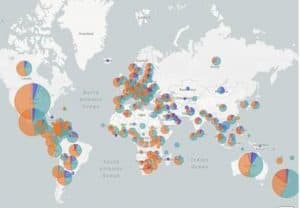This month, Dr. Monica Nolan of the Victorian Department of Health presented to the group on what this wastewater surveillance looks like in 2022 and the innovative work on variants and quantification of SARS-CoV-2 in wastewater that is currently being undertaken in conjunction with Aaron Jex’s team at the Walter and Eliza Hall Institute of Medical Research (WEHI) and David McCarthy’s team at Monash University. One example of an important contribution that the Victorian team has made is the mapping of the prevalence of the Delta variant, Omicron BA.1, and BA.2 sub-variants across metro Melbourne.
Similar work is being undertaken in other laboratories and by health departments across Australia and New Zealand, as well as improving ways to present the data trends on public-facing websites, and shifting the focus of wastewater surveillance to targeted areas such as food processing and rural or vulnerable communities.
WaterRA and its members have also been engaged by the Australian Water Association, under a Department of Foreign Affairs and Trade-funded project, to transfer these Australian skills to countries in the Mekong region as well as Fiji in 2021 and 2022, resulting in valuable cross-cultural knowledge exchange and collaboration.
The will continue to meet to share, exchange knowledge, and subsequently adapt local practices and responses. These teams and their skills will play an important role in Australia’s ongoing local responses to COVID-19 with the opening of our domestic and international borders, and assist our closest neighbours in their national responses as well. WaterRA will continue to support members in these collaborations.

Image sourced 9 Mar 2022: https://nextstrain.org/ncov/gisaid/global



